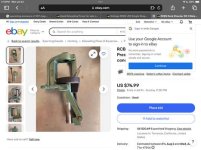I was thinking and wanted to know if this is everything
a single stage press (either Hornady or Rock Chucker)
Brass (saving all I shoot for now)
Bullets (Hornady FTX or Silvertips)
Gunpowder (not sure what would be best)
Powder scale
Load handbook (not sure what's best leaning Hornady)
Primers (not sure large or small or brand)
A 357 dye (unsure on spelling)
Storage: was thinking MTM boxes or zip lock bags and an ammo can. Was thinking a plastic ammo can with water seal for brass with maybe a salt pack or gel to keep it dry) with MTM for finished rounds
I've heard some people have a cleaning item for brass to get it ready before loading but I'm unsure what that is.
Am I missing anything or does that sound about right?
a single stage press (either Hornady or Rock Chucker)
Brass (saving all I shoot for now)
Bullets (Hornady FTX or Silvertips)
Gunpowder (not sure what would be best)
Powder scale
Load handbook (not sure what's best leaning Hornady)
Primers (not sure large or small or brand)
A 357 dye (unsure on spelling)
Storage: was thinking MTM boxes or zip lock bags and an ammo can. Was thinking a plastic ammo can with water seal for brass with maybe a salt pack or gel to keep it dry) with MTM for finished rounds
I've heard some people have a cleaning item for brass to get it ready before loading but I'm unsure what that is.
Am I missing anything or does that sound about right?

